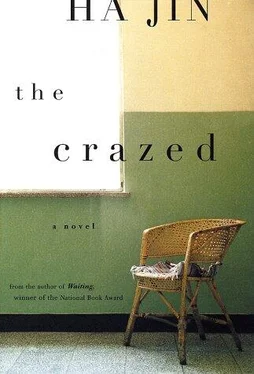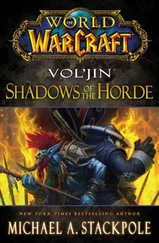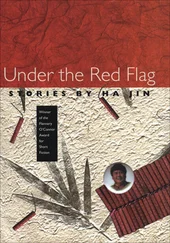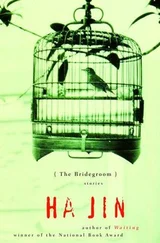When I came out of the exhibition, it was already past twelve o’clock. The sky was grayish with smog, and the air thick with automobile exhaust and frying oil. With less than an hour before my shift started, I had to find a place to eat lunch without delay. I mustn’t be late again.
As I opened the door to the sickroom, Mr. Yang was sitting on the bed and reading the People’s Daily, a pair of bifocals on his nose. His left cheek still bore the marks of the wrinkles in the pillowcase. In a gray cashmere cardigan he looked casual and calm, as if he were taking a break from his work. I glared at Banping and said, “Come out, I want to have a word with you.” We both turned to the door.
“What is it?” he asked the moment we were in the hall.
“Why did you give him the newspaper and the glasses?”
“He wanted to read.”
“But that may hurt his brain. Why are you so careless?”
“Go easy, Jian. How come you’re so crabby today?”
“Dr. Wu told us not to let him read anything, you know that.”
“But if I didn’t give him the newspaper, he’d cry like a little boy and even call me names. He wanted to sit up and study something. What else could I do? The paper at least can keep him peaceful. He said he must know our country’s current affairs.”
“Like a statesman, eh?” I couldn’t help being sarcastic, then heaved a sigh.
He grinned and said, “He’s like a little kid now and we should humor him.”
We both went back into the room. Banping had been rereading Jean-Christophe recently; he picked up the book from the armrest of the wicker chair and thrust it into the side pocket of his jacket. He looked unhappy and left without a word.
I felt bad as I realized I shouldn’t have blown up at him. He might not have had a comfortable time staying with our teacher in this depressing room either.
Soon Mr. Yang began reading an editorial aloud. His voice grew stronger and stronger as he continued. The newspaper was an old back issue. The article was about a flood in the provinces on the Yangtze River. Hundreds of people had drowned; sixteen thousand houses flooded; troops were sent over to help the victims; Vice Premier Zhang was flying from place to place to express the government’s sympathy and solicitude to the victims and to inspect the flood relief measures. Mr. Yang was reading the article ardently as if he were an official addressing an audience of hundreds of people. His mouth was ringed with foam, and spittle darted in every direction, some of it falling on the newspaper and some on the dark green blanket over his legs. He was so excited that he was trembling a little, his eyes glinting behind the lenses.
I went up to him and tried to take the newspaper away, but he gripped it tightly. So I gave up.
A few minutes later he put the newspaper down on his lap and started an official speech. “Comrades,” he shouted with his eyes closed, “our country has difficulties now, what shall we do to help? Under the wise leadership of our Communist Party, we are not afraid of any natural disaster. As long as we rally closely around the Party Central Committee and as long as we help one another, we shall defeat the river and conquer the flood. We Chinese are heroic men and women, capable of holding up the sky and restoring the earth. No natural calamities can daunt us, because we live in a new society now. In the old days a cataclysm of such magnitude would toss millions of corpses everywhere and turn our land upside down. But now it cannot overcome us at all. Why? Why is everybody here still alive, well clad and well fed? Why do many of you still have smiles on your faces? Why are you still healthy and hopeful? The reason is clear and simple — because we have our greatest Helmsman Chairman Mao and the wise leadership of the Communist Party. Comrades, our Chairman is deeply concerned about our well-being. He doesn’t go to bed at night. Instead, he pores over maps and holds emergency conferences to make plans. Although he’s tired and sleepy, he eats oranges and smokes Ginseng cigarettes to keep himself awake. He’s working his heart out to save us from this flood. There’s no doubt he will save us, every one of us! Comrades, we must work ten times harder, care for the old and the young, and faithfully follow the Party leaders. Remember, solidarity is strength!” He paused, panting, then resumed: “Most important of all, we must not lose hope. If you lost your house, our country will build you a new one. If your crops are gone, our country will allocate you seeds and provisions. If your livestock are drowned, our country will supply you with money and young animals. In one word, we shall have everything back and we shall defeat nature. There’s no reason to lose heart.”
He lifted his right hand halfway, looking around with an air of authority; then he held the newspaper with both hands again. “Comrades,” he went on, “in a time like this, we must be more alert to class struggle. Our enemies will not sleep when we are in trouble. I’m sure they will creep out of their holes and sabotage our efforts at every opportunity. They will spread rumors, fan evil fires, and sow the seeds of discontent. Comrades, keep your eyes open on those blackhearted evildoers and redouble your vigilance against—”
“Shut up!” I yelled with a shudder. He was pathetic. He had forgotten that he himself used to be maltreated as one of those so-called class enemies. Oppressed for decades, now he dreamed of ruling others. He didn’t know who he was anymore. I rushed to him, seized the newspaper, threw it to the floor, and stamped on it.
He looked shocked and remained silent for a moment, still holding two tiny scraps of the paper with his thumbs and forefingers. Then he said wistfully, “They ought to have appointed me the general director of the flood relief work. I’m more capable than any of those bureaucrats, who are just rice bags and wineskins.”
“You’ve forgotten who you are,” I said deliberately.
“I’m a born official.”
“No, you’re just a crazy bookworm.”
“I’m destined to govern.”
“You can’t even govern yourself.”
He paused for a few seconds, then blustered, “Oh, how dare you talk to me like this! If you were not my son, I would have you hauled out and beheaded. Heavens, how can I have sired such an unfilial thing?” He began wailing, tears trickling down his fleshy cheeks.
That frightened me. No matter how furious I was, I shouldn’t have disturbed him so much. I sat down on the bed and put my hand on his shoulder. I said, “I didn’t mean to hurt your feelings, Mr. Yang. I just hate to see you make a fool of yourself. Don’t be so heartbroken. See, I’m here to take care of you.”
“Am I still an official?”
“Sure, you hold the fifth rank, the same as the provincial governor’s.”
“Do I have a chauffeur and a chef?”
“Yes, a dozen servants.”
“And a personal doctor?”
“Of course, a complete staff.”
“Including four armed bodyguards?”
“Sure, you have a squad of them.”
“Also a Red Flag sedan?”
“Yes.”
“No, I like a Mercedes-Benz better.”
“All right, you can have that.”
He calmed down, but was still sniveling. Again with a spoon I slowly ground a sleeping pill in a cup, poured some orangeade into it, and fed the concoction to him. He obeyed me like a child exhausted by crying. After that, I put him back into bed.
As he sank into sleep, I picked up the newspaper from the floor and looked through it. I was not interested in the old news, but a photo on an inner page caught my attention and gave me the creeps. It showed a young woman, eyes shut and crying with her mouth wide open as if she were laughing. She had jumped off a smuggling sampan, swimming toward Hong Kong, but a shark had attacked her and ripped a large piece of flesh off her thigh. Her femur showed, whitish like a debarked tree branch and dripping blood. A police boat had rescued her and carried her to a hospital nearby. Later she was returned, together with a pair of crutches, to her hometown in Hubei Province. Evidently the picture was intended to deter people from sneaking across the water into Hong Kong. There were other photos on the same page. One of them showed the fossil of a dinosaur egg found in the Mongolian Plain by a team of American paleontologists.
Читать дальше

![Lao Zi - Dao De Jing [Tao Te Ching] (english)](/books/3890/lao-zi-dao-de-jing-tao-te-ching-english-thumb.webp)
![Lao Zi - Dao De Jing [Tao Te Ching] (chinese)](/books/3891/lao-zi-dao-de-jing-tao-te-ching-chinese-thumb.webp)
![Lao Zi - Dao De Jing [Tao Te Ching] (espanol)](/books/3892/lao-zi-dao-de-jing-tao-te-ching-espanol-thumb.webp)







